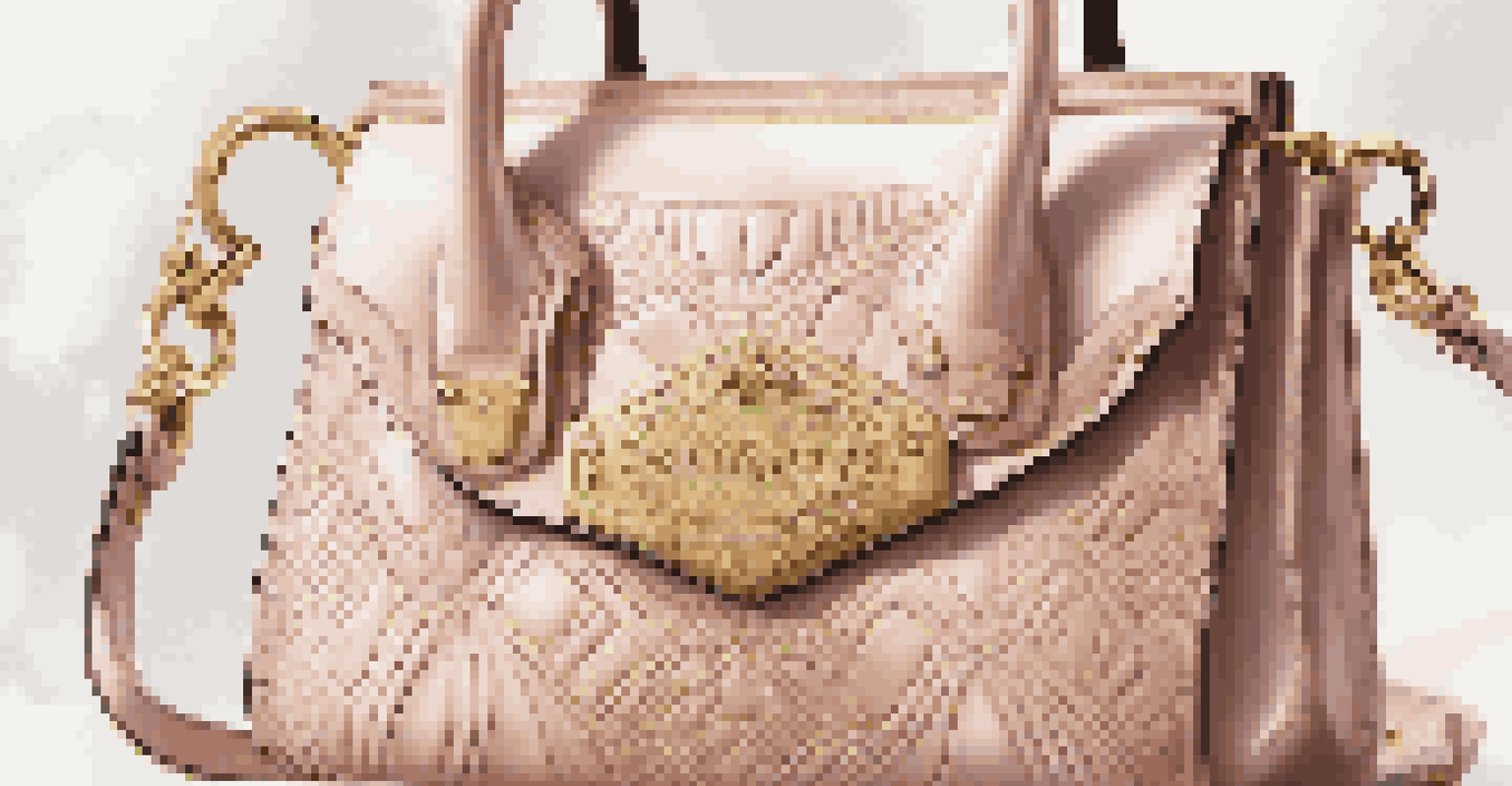Luxury Fashion Icons: Case Studies in Brand Loyalty

Defining Luxury Fashion Icons and Their Influence
Luxury fashion icons represent the pinnacle of style and elegance, embodying the values of high-end brands. Think of names like Chanel, Gucci, and Louis Vuitton, which evoke a sense of exclusivity and aspiration. Their influence stretches beyond mere clothing; they set trends and shape consumer perceptions of luxury.
Luxury is in each detail.
These icons are not just brands; they are cultural phenomena that resonate with people around the globe. By creating a persona that aligns with a target audience's aspirations, luxury fashion icons cultivate a loyal following. This deep connection often transforms casual consumers into brand advocates who proudly showcase their affiliation.
Moreover, the allure of luxury fashion icons lies in their storytelling. Each brand crafts a narrative that speaks to its heritage, craftsmanship, and unique design philosophy, further solidifying its place in the hearts of consumers. This storytelling aspect is pivotal in developing brand loyalty, as it invites consumers into an exclusive world rich with history and prestige.
The Role of Exclusivity in Brand Loyalty
Exclusivity is a cornerstone of luxury fashion, and it plays a crucial role in fostering brand loyalty. By limiting access to certain products or experiences, brands create a sense of urgency and desire. For instance, when a limited-edition handbag is released, the race to acquire it often boosts its perceived value and allure.

This exclusivity taps into the psychology of consumers, who often equate rarity with value. When customers feel they own something that few others do, it enhances their connection to the brand. This phenomenon is particularly evident in high-stakes fashion auctions, where rare items can fetch staggering prices, further elevating the brand's prestige.
Exclusivity Drives Brand Loyalty
Luxury brands create a sense of urgency and desire through limited access to products, enhancing their perceived value.
Additionally, luxury fashion brands often engage in exclusive collaborations with celebrities or artists, further enhancing their allure. These partnerships not only create buzz but also reinforce the idea that owning a piece of the collection is a status symbol. This strategy effectively cultivates brand loyalty by making consumers feel like part of an elite group.
Emotional Connection: Building Loyalty Through Storytelling
Emotional connection is a powerful driver of brand loyalty in the luxury fashion industry. Brands like Dior and Valentino don’t just sell clothing; they sell a lifestyle and a dream. Through poignant storytelling in their marketing campaigns, they create narratives that resonate with consumers, making them feel emotionally invested.
Fashion is the armor to survive the reality of everyday life.
Consider how a campaign might feature a celebrated designer's journey, showcasing the passion and creativity behind each piece. This not only humanizes the brand but also allows consumers to see themselves in the narrative. When people feel an emotional bond, they are more likely to remain loyal to the brand, purchasing time and again.
Moreover, social media has become a vital platform for storytelling, enabling luxury brands to share their narratives in real-time. Consumers can connect with brands on a personal level, engaging with their stories and sharing their own experiences. This two-way interaction fosters a community around the brand, further solidifying loyalty.
The Power of Heritage in Luxury Branding
Heritage plays a significant role in establishing brand loyalty among luxury fashion icons. Brands like Burberry and Hermès often highlight their rich histories, emphasizing a legacy of quality and craftsmanship. This historical context reassures consumers that they are investing in something timeless.
When a brand can trace its roots back to a specific time or place, it adds depth to its identity. For many consumers, purchasing from a brand with a storied past feels like joining a tradition rather than just making a transaction. This cultural significance creates stronger emotional ties, enhancing brand loyalty.
Emotional Connections Matter
Storytelling in marketing fosters deep emotional bonds between luxury brands and consumers, leading to lasting loyalty.
Additionally, heritage can manifest through signature pieces that remain unchanged over the years. The Burberry trench coat or the Hermès Birkin bag are examples of items that encapsulate a brand’s history while remaining sought-after. This consistency not only appeals to loyal customers but also attracts new ones who appreciate the heritage behind the product.
The Role of Celebrity Endorsements in Brand Loyalty
Celebrity endorsements are a powerful tool in the luxury fashion industry, often driving brand loyalty to new heights. When a beloved figure endorses a brand, it instantly elevates the brand’s status and desirability. Think of how iconic celebrities like Rihanna or Beyoncé can transform a brand's image with just a single appearance.
These endorsements can create a ripple effect, where fans of the celebrity become interested in the brand. This strategy is particularly effective in social media marketing, where influencers showcase their favorite luxury items, prompting their followers to want to emulate their style. The allure of owning what their idols wear fosters a deeper connection with the brand.
Moreover, collaborations between luxury brands and celebrities often result in unique, limited-edition collections, further enhancing brand loyalty. When fans have the chance to own a piece of a celebrity’s personal style, it feels like a unique experience. This exclusivity, combined with the cachet of celebrity endorsement, creates a compelling reason for consumers to stay loyal.
Sustainability: A New Dimension to Brand Loyalty
In recent years, sustainability has emerged as a key factor influencing brand loyalty in the luxury fashion sector. As consumers become more environmentally conscious, they increasingly seek brands that prioritize ethical practices. Luxury brands that adopt sustainable methods not only attract eco-minded consumers but also foster loyalty through shared values.
Consider brands like Stella McCartney, which has built its identity around sustainable fashion. By transparently communicating their commitment to ethical sourcing and environmental responsibility, they appeal to a growing demographic that values these principles. This alignment of values creates a deeper emotional bond between the consumer and the brand.
Sustainability Shapes Consumer Choices
As consumers prioritize ethical practices, luxury brands that embrace sustainability can cultivate loyalty through shared values.
Additionally, luxury brands that emphasize sustainability often tell a compelling story about their efforts, further enhancing their appeal. For instance, showcasing the artisans who create their products or the sustainable materials used can create a narrative that resonates with consumers. This approach not only drives brand loyalty but also positions the brand as a leader in the evolving landscape of luxury fashion.
Conclusion: The Future of Brand Loyalty in Luxury Fashion
As the luxury fashion landscape continues to evolve, brand loyalty remains a critical focus for fashion icons. The strategies that have historically driven loyalty—exclusivity, storytelling, heritage, and celebrity endorsements—are being complemented by the growing importance of sustainability. Consumers are looking for brands that reflect their values, making it imperative for luxury fashion icons to adapt.
Moreover, the rise of digital platforms offers new opportunities for engagement, allowing brands to connect with consumers in innovative ways. Social media, e-commerce, and immersive experiences are reshaping how brands build loyalty, making it a dynamic and exciting area to watch. As brands navigate these changes, maintaining authenticity will be essential to retain consumer trust.

Ultimately, the future of brand loyalty in luxury fashion will hinge on a brand's ability to resonate deeply with its audience. By staying true to their heritage while embracing modern values, luxury fashion icons can ensure they continue to foster brand loyalty for generations to come.